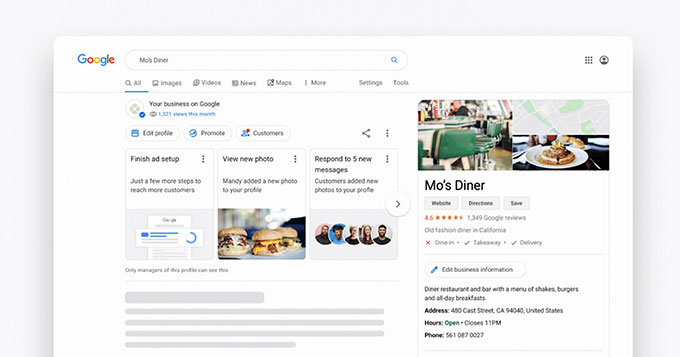Jump to:
What do you do when you need a local business that can deliver a Toy Story themed cake for your kid’s birthday, sell you the Xbox game your buddy recommended, or fix your favorite pair of shoes? Of course, you pull the smartphone out of your pocket and perform a little online research to find the contact info that you need.
Your customers are no different, and when they’re looking for a product or service similar to what your small business sells, they’re also conducting a little online research to find it. As a matter of fact, 88% of consumers who perform local research on their mobile devices call or visit a store the very same day.
All this, combined with the fact that Google handles around 5.6 billion searches each day, leads to one clear and evident conclusion – local search is a massive business, and small businesses can profit tremendously from prominent emplacement in local search results.
 Photo from Moz
Photo from Moz
So, how can your small business attain prominent positioning in local search results? The answer to this question is straightforward and comes in three letters only: SEO. These three letters stand for search engine optimization, which essentially is the practice of enhancing the quantity and quality of traffic to your website via organic search engine results.
A powerful local SEO strategy is vital to driving more people toward your business, but creating such a strategy demands time, research, and investment. And while you might be able to manage the first two, money’s much harder to spare for small businesses as most of them experience cash flow problems and work with a tight marketing budget. However, the best and most effective SEO strategies for small businesses don’t have to cost big bucks. Even the smallest companies can take advantage of the best SEO strategies on a budget.
This blog post will address the areas you need to focus on to achieve better positioning in search engines’ local search results. Here are the five most effective easy-to-do SEO strategies for small businesses that you can start implementing today.
Keyword Research And Target Keywords
Keyword research helps businesses better understand what consumers are searching for online and consequently optimize their websites to emerge in their market’s top search results. Essentially, keyword research is the technique of researching and determining keywords and whole phrases that the online audience uses to search for a particular outcome. Identifying these keywords and putting them into your website is one of the top SEO strategies for small businesses that can help your website rank better in search engines.
 Photo from Elegant Themes
Photo from Elegant Themes
In case you’re new to keyword research, begin by writing topics associated with your business into a search engine. A shoe repair shop, for instance, might use keywords like “shoe repair shop,” “shoe fixing,” shoe repair near me,” and other related terms. Furthermore, searching for keywords will help you see what keywords your main competitors are ranking for, as this step can help you narrow down your research.
Once you’ve established which keywords to target, you can start by incorporating these words and phrases into the key places on your website like:
- Title tags, especially headers, suggest to search engines what your site is about
- URLs demonstrate to search engines how to navigate your site
- Image alt texts show the engines what your images contain
- Meta descriptions suggest to searchers what your content is about in the search engine results pages
Conducting thorough keyword research and incorporating target keywords into your website content is an easy way to enhance your SEO for free with little time, effort, and dedication. It’s also a smart move for small businesses to rank for their name, as you want to ensure that when people search for your brand name, they will effortlessly find your website, social media profiles, and positive reviews.
Optimize Your Website For Local Search Results
Search engine results change based on location making local SERPs incredibly important for small businesses such as restaurants, event planning studios, cafes, local artisans, etc. That’s why small businesses that use SEO should embrace local search optimization to target results pages by exact location.
Google, the world’s best and most used search engine, provides clear guidelines for achieving a better ranking in local search results through Google My Business (GMB), Google’s very own business listing service. Each business creates a GMB profile and appears next to search results for specific keywords depending on the consumer’s location.
A GBM profile reveals the business’s location, address, website, phone number, and showcases reviews in one convenient location within the search engine results pages. Furthermore, Google determines local ranking by the company’s relevance, distance, and prominence.
Optimizing your website for local search results is an absolute must-do when speaking about the most effective SEO strategies for small businesses. By doing so, you will validate your business’s relevance in your area and place yourself in a top position to consumers who reside close to you.
 Photo from Search Engine Journal
Photo from Search Engine Journal
Create High-Quality Content
The quality of the content you create impacts both the SEO efforts and search ranks of your website in a colossal way. It’s of the highest importance that the relevancy of your website’s content is in close relation to your target audience and potential customers. As one of the fundamental SEO strategies for small businesses, content marketing’s goal is to create high-quality and genuinely valuable content to build a lasting relationship with prospective customers.
 Photo from Search Engine Land
Photo from Search Engine Land
To provide this high-quality content that’s exceedingly relevant to your customers, it’s imperative for you as a business owner to have deeper insights into your audience’s most significant interests and what they consider valuable. For this reason, we recommend you always observe and audit your website to keep track of the varying patterns of usage.
For instance, as a small business, you can leverage your company blog to answer audience inquiries and questions, providing useful solutions to common pain points or challenges. Your website or blog content doesn’t have to be Pulitzer Prize-winning material, and you don’t have to hire professional writers to create it. Thereby, you, as the business owner or other teammates who excel at particular topics related to your business’s essence, can contribute to your company’s blog, improving user experience and boosting your local SEO efforts.
Make Sure That Your Website’s Mobile Friendly
With more than four billion mobile phone users worldwide, small businesses can’t afford to ignore the impact of mobile web use. Nowadays, mobile browsing is more prevalent than desktop browsing, and according to Google, mobile searchers are more likely to turn into buying customers.
Search engines started mobile-first indexing a couple of years ago, using the mobile versions of web pages to determine their ranking. They began this beneficial practice to ensure that the growing number of mobile searchers find what they need conveniently and efficiently, as more than 50% of all searches these days come from mobile devices.
 Photo by Markus Spiske from Unsplash
Photo by Markus Spiske from Unsplash
Small businesses with a strict marketing budget can leverage Google’s free mobile-friendly testing tool to evaluate how optimized their website is for smartphone users. Minimizing load times, enabling Accelerated Mobile Pages (AMP), and reducing media size can help increase mobile performance.
Search engines, especially Google, value well-built websites that quickly provide accurate information. For that reason, small businesses should invest in high-quality websites that are fast and easily navigable for mobile devices to boost their local SEO efforts.
Invite Customers To Leave Reviews
Online reviews can help small businesses in many ways. First and foremost, they can help build credibility and gain trust when they emerge on SERPs. Observing that a particular company has five-star reviews while the other companies that offer similar products or services have four and three-star reviews can make customer decisions more straightforward. Actually, 88% of people trust online reviews just as much as personal recommendations, making it a key SEO strategy for every small business out there.
 Photo by Jonas Leupe from Unsplash
Photo by Jonas Leupe from Unsplash
Invite your customers to leave reviews of your products or service and create more fresh content related to your company, and if they contain any target keywords, all the better. Don’t hesitate to encourage clients to leave reviews after making a purchase, whether on Google or a special reviews website.
Final Thoughts
Even if small companies face enormous competition from established brands and more prominent companies and corporations, there’s still a lot you can do to boost your SEO without substantial funds. Follow our five effective SEO strategies for small businesses and make your business online relevant on a budget.
Take advantage of the strategies mentioned above: optimize your site for local search results, make sure that it’s mobile-friendly, do thorough keyword research, publish new high-quality content regularly, invite your clients to leave reviews, and help your small business increase its visibility and climb the SERPs.